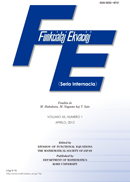All issues

Volume 60 (2017)
- Issue 3 Pages 279-
- Issue 2 Pages 133-
- Issue 1 Pages 1-
Volume 60, Issue 1
Displaying 1-4 of 4 articles from this issue
- |<
- <
- 1
- >
- >|
-
Takeshi Fukao, Yutaka Tsuzuki, Tomomi Yokota2017 Volume 60 Issue 1 Pages 1-20
Published: 2017
Released on J-STAGE: April 22, 2017
JOURNAL FREE ACCESSThis paper is concerned with a system of p-Laplace heat equations with constraints and Navier-Stokes equations. The existence and uniqueness of solutions have been already proved for several types of the system in 2-dimensional domains. This paper gives the existence result in 3-dimensional domains, where the diffusion term on heat equations is the p-Laplacian with p ≥ 3. This work provides a first insight towards the full case p ≥ 2.View full abstractDownload PDF (166K) -
Stéphane Malek2017 Volume 60 Issue 1 Pages 21-63
Published: 2017
Released on J-STAGE: April 22, 2017
JOURNAL FREE ACCESSWe study an inhomogeneous linear q-difference differential Cauchy problem, with a complex perturbation parameter ε, whose coefficients depend holomorphically on ε and on time in the vicinity of the origin in C2 and are bounded analytic on some horizontal strip in C w.r.t the space variable. This problem is seen as a q-analog of an initial value problem recently investigated by the author and A. Lastra in [9]. Here a comparable result with the one in [9] is achieved, namely we construct a finite set of holomorphic solutions on a common bounded open sector in time at the origin, on the given strip above in space, when ε belongs to a well selected set of open bounded sectors whose union covers a neighborhood of 0 in C*. These solutions are constructed through a continuous version of a q-Laplace transform of some order k ≥ 1 introduced newly in [6] and Fourier inverse map of some function with q-exponential growth of order k on adequate unbounded sectors in C and with exponential decay in the Fourier variable. Moreover, by means of a q-analog of the classical Ramis-Sibuya theorem, we prove that they share a common formal power series (that generally diverge) in ε as q-Gevrey asymptotic expansion of order 1/k.View full abstractDownload PDF (325K) -
Gaku Hoshino, Pavel I. Naumkin2017 Volume 60 Issue 1 Pages 65-75
Published: 2017
Released on J-STAGE: April 22, 2017
JOURNAL FREE ACCESSWe study the global Cauchy problem for the non gauge invariant Schrödinger equations i∂tu + Δu/2 = λuσ, (t,x) ∈ R × Rn, u|t=0 = φ, x ∈ Rn, where σ = 1 + 4/n, n = 1,2,4. The application of the Galilei generator for the proof of the analytic smoothing effect of solutions to the Cauchy problem for non gauge invariant Schrödinger equations involves difficulties. In this paper we construct analytic solutions to the non gauge invariant Schrödinger equations in the case of analytic and sufficiently small initial data. We use the power like analytic spaces and the analytic Hardy spaces as auxiliary analytic spaces characterized by the Galilei generator. Also we show that if the initial data φ decay exponentially and are sufficiently small in an appropriate norm, then the solutions of the Cauchy problem for non gauge invariant Schrödinger equations exist globally in time and are analytic.View full abstractDownload PDF (108K) -
Katsuhisa Mimachi2017 Volume 60 Issue 1 Pages 77-132
Published: 2017
Released on J-STAGE: April 22, 2017
JOURNAL FREE ACCESSWe study monodromy representations associated with Appell's hypergeometric functions F2 and F3 by using integrals of multivalued functions. In particular, we derive Nakagiri's matix elements of the representations in a different manner and relax his conditions on the parameters. As an application, we give a simple and elementary derivation of sufficient conditions that the systems of differential equations satisfied by F2 and F3 are irreducible.View full abstractDownload PDF (2061K)
- |<
- <
- 1
- >
- >|